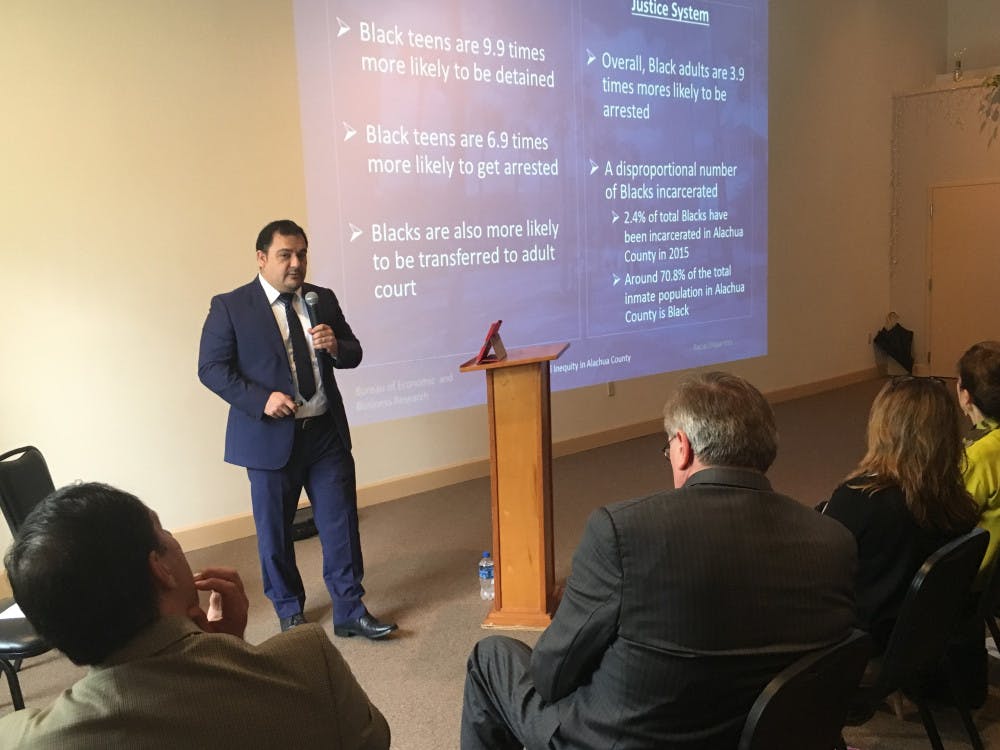Santa Fe College President Jackson Sasser turned to his state senator, Keith Perry, before an audience of more than 200 Friday afternoon with a firm message.
“It will take the legislature, it will take the chamber,” Sasser said of how to tackle Alachua County’s looming racial disparities. “It will take all of us.”
Local leaders and activists gathered in East Gainesville’s Mt. Moriah Missionary Baptist Church, located at 718 SE 11th St., for conversation about a much anticipated report presented by UF’s Bureau of Economic and Business Research, “Understanding Racial Inequity in Alachua County.” The talk brought forth some glaring examples of inequity in the county, while some said the solutions aren’t there yet.
UF assistant professor Hector Hugo Sandoval Gutierrez combed through data from the 98-page document to an audience that included Mayor Lauren Poe, UF President Kent Fuchs, city and county commissioners, Alachua County Public Schools board members, the Alachua County Labor Coalition and Gainesville For All organizers, along with many others.
Inspired by a similar study by leaders in Madison, Wisconsin, UF’s BEBR — sponsored by Santa Fe College, ACPS, Gainesville Area Chamber of Commerce, UF Health, and the city and county — compiled data on issues ranging from child poverty to unemployment among the county’s white, black, hispanic and Asian populations.
For about an hour, Gutierrez went through the facts.
At 35.7 percent, black poverty in Alachua County is greater than that of Florida and the U.S., with black childhood poverty at 44.6 percent.
Gutierrez also said Alachua County’s black residents are over 2.5 times more likely to be unemployed than its white residents.
Along with attracting businesses to invest and develop in East Gainesville, Gutierrez said improving public K-12 education for black students will go a long way toward improving racial inequity overall.
Alachua County has Florida’s highest achievement gap between white and black students on end-of-year exams, according to Alligator archives.
“I believe that to provide a high-quality education experience is significant and will change the life for minorities,” Gutierrez said. “College is not necessary to get a good job, but what is essential is to get a good-paying skill set.”
After the presentation, organizers thought about how to move forward and fix the issue.
Diedre Houchen, the education chair for racial inequity task force Gainesville For All, said although the data was disheartening, it simply confirmed what many activists already knew.
Houchen said whatever solutions people begin crafting need to include the residents themselves.
“I think that whatever is done should certainly include the participation of African Americans within the county — that’s going to be essential,” she said. “Their agency at the table is needed.”
Perry said he felt the presentation was an important step in canvassing the disparity, and now legislators need to push change forward.
The senator cited his proposed Early Childhood Music Education Incentive Pilot Program, SB 654, which would financially incentivize school districts to offer 30 minutes of certified music education twice a week for students between kindergarten and second grade.
“We see the gaps start out for students early and continue to grow,” Perry said. “What can we do at the youngest of age for them?”
For Rosana Resende, the format of the presentation event amounted to a waste of time.
Resende, a lecturer with UF’s Center for Latin American Studies invited to the event by the Latina Women’s League, was in awe at the audience in the room, filled with nearly every person one could imagine who’s working on improving the county, from social workers to politicians.
Despite the talent in the room, there was no time dedicated to workshopping or pausing to let the organizers hash out possible solutions.
Instead, people were instructed during the Q&A session to write down questions anonymously and pass them down rows of people to the front where President Sasser read and answered them.
“A lot of us are professionals who deal with this kind of stuff,” Resende said. “We’re ready to go, you know?”
Resende said she was entirely disappointed with how the meeting was focused on describing the problem rather than answering it.
“This is amazing human capital,” she said, looking around the room. “Maybe we can’t implement solutions right away, but why in the world can’t we powwow about this kind of stuff and brainstorm some ideas together.”
President Fuchs also announced during the presentation that, independent of the study, he asked UF’s Human Resource Services to look into the university’s OPS, or other personnel services, employee classification.
Fuchs said he’s concerned some OPS workers — who are paid hourly, are not offered the same benefits as permanent staff and often come from minority and low-income backgrounds — should receive better classification given how long they've worked for the university.
He asked human resources to look into the OPS classification after Hurricane Irma, when hourly paid workers were not repaid for time lost after UF canceled four days of class, according to alligator archives.
“It may indeed be that we are misusing that job classification,” he said. “It may be, frankly, we should have fewer OPS workers and have more of them be regular workers.”
Contact David Hoffman at dhoffman@alligator.org. Follow him on Twitter at @hoffdavid123.
UF assistant professor Hector Hugo Sandoval Gutierrez presents data on racial inequity within the county to an audience of more than 200 Friday afternoon at the Mt. Moriah Missionary Baptist Church, located at 718 SE 11th St.






